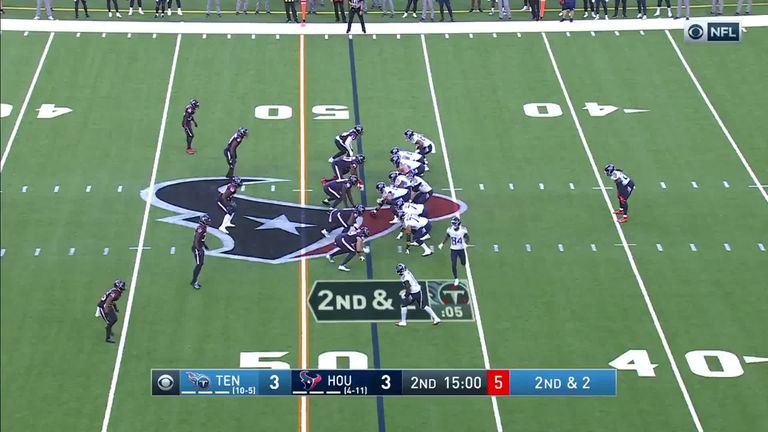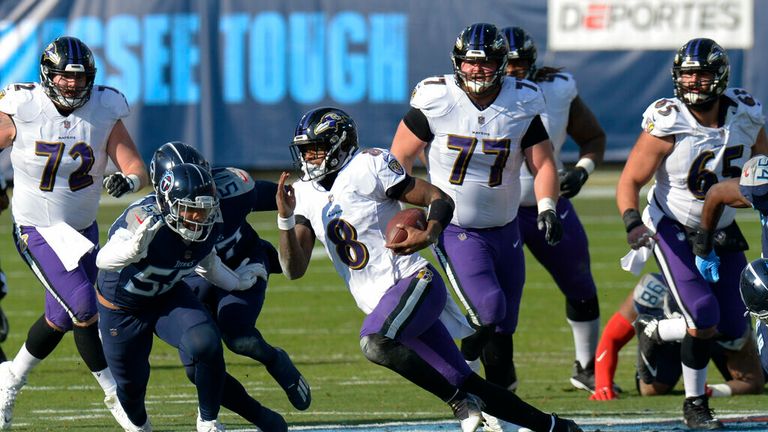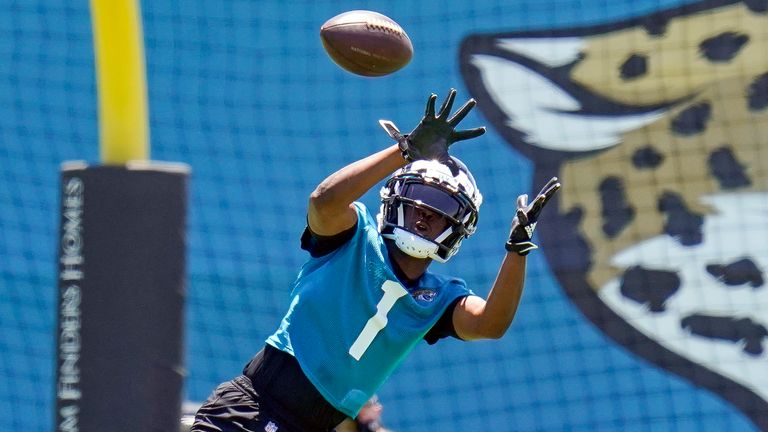Julio Jones trade gives Tennessee Titans offensive coordinator Todd Downing dream do-over
After an unsuccessful stint as Raiders offensive coordinator in 2017, Todd Downing has a star-studded crack-team at his disposal as he looks to fill the void left by Arthur Smith at the Tennessee Titans.

Thursday 17 June 2021 10:35, UK
'Pick your poison' be the message from Titans new man Julio Jones upon slotting into Tennessee's near-complete jigsaw. But who be chief poison-picker?
That job shall belong to Todd Downing, who, while cushioned by an envied weaponry in his second shot as an offensive coordinator, will realise that the same scenario affords him few excuses not to be successful as play-caller, string-puller, poison-picker in Nashville.
In Jones he has a defense-dwarfing seven-time Pro Bowler, a two-time receiving yards leader, a two-time first-team All-Pro, exemplary virtuoso and perennial top three wideout; in Derrick Henry a tackle-swatting Fighting Bull whose backfield prowl has amounted to two successive Pro Bowl selections, two successive rushing yard titles, two successive rushing touchdown titles and a seat in the 2,000-yard club; in A.J. Brown a body-hauling number one receiver in-waiting and in Ryan Tannehill a reborn top 10 quarterback. The main meal comes with its complementary side dishes, too.
Trading for Jones likely had its ulterior motives beyond the shrewd acknowledgement of a possible Championship window: namely offering Downing the receiving siren that's presence is engrained in defensive game-plans, which will only serve to benefit his new teammates. Particularly Brown, who pitched hard for his idol to join him as a double-team-denier at Nissan Stadium.
Downing lived in 11 personnel for 70 per cent of the time while offensive coordinator of the Oakland Raiders in 2017, and though his options mean that could prove the case again he may well be hoping it's where the similarities end.
Portrayals as an offensive wizard following the Week One win over the Titans had by the end of the 2017 season evolved into Downing being labelled 'in over his head' by David Carr, brother to Raiders quarterback Derek. For a culmination of reasons it all fell a little dreary at an equally-uninspiring period for the Raiders franchise, which capsized to a 6-10 finish a season after ending its 13-year playoff drought with a 12-4 record in 2016.
Eyebrows lifted when head coach Jack Del Rio cut ties with offensive coordinator Bill Musgrave following the Wild Card defeat to the Houston Texans, especially given his role alongside Downing in helping Carr towards back-to-back Pro Bowl seasons.
Downing was subsequently named Musgrave's replacement in a promotion from quarterbacks coach, a role that he had also previously carried out with the Detroit Lions and Buffalo Bills.
The result was an ugly decline on offense. The Raiders collapsed from 6th overall in 2016 to 18th under Downing, going from 13th in passing to 16th, 6th in rushing to 25th and 7th in scoring to 23rd.
They lacked the subterfuge and deception and unpredictability with motioning pieces pre-snap and disguised concepts of those around them, Carr's efficiency took a hit as he nursed niggling back issues down the stretch, wide receiver Amari Cooper's production fell off a cliff, there was a case for an ageing Marshawn Lynch being under-utilised and what was then the highest-paid offensive line in the NFL struggled to play like it. Combine the aforementioned with the defense failing to record an interception through the first 10 games of the season and the Raiders were stagnant across the board.
Upon being fired alongside Del Rio and the rest of his coaching staff at the end of the season, Downing returned for his second spell with the Minnesota Vikings, where he had served as offensive quality control coach in 2005, this time as senior offensive assistant before eventually beginning the campaign as tight ends coach.
There he assisted Kyle Rudolph as he recorded career second-best returns of 64 catches and 634 yards receiving, until he was hired to the same role by Mike Vrabel and the Titans in 2019, since overseeing Jonnu Smith's ascent as he incorporated sneaks and swings and out routes on his way towards becoming one of the league's most productive in his position.
Downing is now tasked with succeeding Smith, who begins his tenure as Atlanta Falcons head coach having schemed his offense towards a tied-2nd most yards per game (396.4) last season, with the Titans ranking 23rd in passing, 2nd in rushing and 4th in scoring.
"I think there would be pressure if I looked at it as: My job is to fill Arthur's shoes'," Downing told reporters this offseason. "But I think each year is its own year. It has its own challenges, its own components. I look at this job more as what Coach (Mike) Vrabel and Jon Robinson asked me to do to fill it this year, not to be Arthur Smith or to be anybody else.
"I am not as caught up in putting Todd Downing's stamp on the offense as I am coming up with what the right recipe for the ingredients we have is, and making sure that we're as competitive and consistent as we can be."
On the heels of Tennessee's potency in 2020, few could blame Downing were he to blend a natural desire to make this offense his own with components of Smith's own style.
Downing called play-action just 14 percent of the time (30th in the league) during his stint as Raiders offensive coordinator, an approach you would envision him expanding on given its role in Smith's system.
The Tannehill play-action discussion is an interesting one. According to ESPN Stats & Info, he ranked 32nd out of 35 qualifying quarterbacks in play-action completion percentage (60.1), however, managed to register a third-most 1,561 yards for a tied-seventh-most 11 touchdowns while his 9.6 averaged yards per attempt was bettered only by Tom Brady and Deshaun Watson. Smith and the Titans employed play-action as an effective avenue to chunk plays; when it worked, it worked well.
At the same time, Tannehill also recorded a 68.3 completion percentage in non-play-action scenarios, throwing for 21 touchdowns to four interceptions and averaging seven yards per attempt. So just a reminder he can do it both ways.
But when Henry gives defensive coordinators no choice but to stack the box, why wouldn't Downing pursue play-action knowing the likelihood of Mount Julio finding himself one-on-one downfield?
It ideally makes for a seamless introduction for free agency pickup Josh Reynolds coming from a Los Angeles Rams offense in which he had become a reliable target for Jared Goff in play-action, bootleg, and RPO situations.
Downing's Raiders meanwhile ranked 30th in rushing attempts per game (23.1) with Lynch leading things out of the backfield behind an offensive line that endured difficulties transitioning from a power scheme to zone blocking.
He appears to be better equipped in Tennessee in that regard with a line far better suited to accommodating Henry's threat from wide/outside zone. Second-round offensive tackle Dillon Radunz will aid the gap cause too as he arrives out of North Dakota State with a glowing reputation as a run blocker.
Smith's Titans also laid the foundations for the balance required on offense, lining up in 11 personnel 38 percent of the time and 12 personnel 35 percent. That includes using two tight ends in 12 on 36 percent of run plays and one tight end in 11 on 31 percent of run plays, meaning the departure of Smith in free agency could impact how Downing builds on that.
It thereby creates the opportunity for Anthony Firkser to assume a more prominent role after working closely with Downing to increase his workload in 2020.
The 2017 undrafted free agent out of Harvard saw his snap count increase from 198 (20 percent) in 2019 to 348 (32.4 percent) last season, Smith using him regularly in 12 personnel with flood and smash concepts as a means of identifying soft spots on intermediate routes.
Between the crossers, the sneaks and the whip routes evident on tape along with the loss of Smith, Firkser is primed to be a familiar feature at middle field.
An aspect to look out for when it comes to Downing's offense could be his use of running backs in the passing game. Raiders running backs were targeted 119 times under Downing, and 161 times when including Cordarrelle Patterson, who occasionally operated out of the backfield.
Granted, Henry's presence and power reduces the need to motion him into the flat, but the pass-catching talents of second-year running back Darrynton Evans, limited to five games in his rookie season, offers Downing a chance to expand on the 57 targets for Titans running backs in 2020, which includes the five for fullback Khari Blasingame.
Evans posted 1,480 yards rushing for 18 touchdowns from 255 carries alongside 21 catches for 198 yards and five scores in his 2019 season with Appalachian State.
Five years is an age in the NFL and plenty of time for Downing to have reflected, learned, recalibrated, absorbed and re-prepared for an offensive coordinator job that perhaps caught him off-guard in Oakland at the time.
Julio is Julio. He will run and leap and catch and destroy, weaving in the gritty blocking side as he has done throughout his entire career. Brown has supplemented the curls, the drags and the crossers with an enhanced ability to both break down field as a game-changer and combat man coverage with violence to his hand usage and breaks. There is arguably more pressure on Henry to sustain his influence and continue defying a game that seems desperate to abandon power backs.
Julio's arrival was a major step towards ultimate goal for the Titans. Maybe the biggest step is Downing competing with the Eric Bieniemys, the Brian Dabolls and the Greg Romans of the AFC.
Between a glaringly more harmonious environment compared to that in Oakland, a star-studded offense and necessary upgrades to a defense that hindered Tennessee last season, Downing is in as welcome a position as he could have wished for in what is possibly a second audition.
Follow the latest offseason news across Sky Sports' digital channels and @SkySportsNFL on Twitter.





